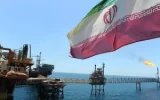Reasons for the failure of the sanctions on Iran’s oil fleet

According to Energy Press, Western media usually refers to the Iranian and Russian oil sanctions-evading tankers as the “shadow fleet,” which they claim is awaiting a new round of sanctions that coincides with Donald Trump’s return to the White House and the possibility of developments that have paved the way for new beginnings.
Almost all experts believe that the new Trump era will see the imposition of more stringent sanctions on Iran, which was confirmed by “Massad Bolos,” Trump’s senior adviser on Middle East affairs, who said that the president-elect will bring the maximum-action strategy back to the forefront. Of course, Trump announced during his 2024 election campaign that he had no intention of harming Iran unless Iran crossed his “red line,” which is nuclear weapons.
It should be noted that, according to some estimates, Iran’s oil exports increased from 400,000 barrels in 2024 to 1.4 million barrels per day in 2020. These exports have been declining since Trump imposed a full ban in 2019, falling from 2.5 million barrels in the first half of 2018 to just 250,000 barrels in 2019. China’s oil imports also rose 7% in the 11th month of this year, but the share of Iran, Russia and Venezuela has fallen significantly, accounting for a quarter of China’s imports, down from a third last October.
Details of the new sanctions
According to a report by Tarnama News in Baku, on November 21, 2024, the US Treasury Department’s Office of Foreign Assets Control (OFAC) announced a new round of sanctions against 35 legal entities and vessels involved in transporting Iranian oil. The decision is part of a larger strategy to increase pressure on Tehran, following recent tensions with Israel. The sanctions are also in line with US goals to counter Iran’s influence in the Middle East and Tehran’s use of oil revenues to finance its budget.
Iran’s oil sector remains a key economic pillar for the country and provides significant revenue. The aim of the recent US sanctions is to disrupt this financial pipeline. By targeting the entities and vessels that facilitate Iran’s oil exports, Washington aims to cut off funding for these activities and increase economic pressure on Tehran.
To implement these measures, of course, the US has deployed a broad regulatory and enforcement framework. According to Western claims, the “shadow fleet” of tankers used by Iran has become a focal point. The fleet evades sanctions through sophisticated tactics. These methods allow Iranian oil to reach international markets, especially in Asia, where buyers often do not comply with US sanctions.
Tags:oil
- Comments sent by you will be published after approval by site administrators.
- Comments that contain slander will not be published.
- Comments that are not in Persian or not related to the news will not be published.

Comments
Total comments : 0 Awaiting review : 0 Date: 0